The 12th
LaureateTheatre/ Film
Stephen Sondheim
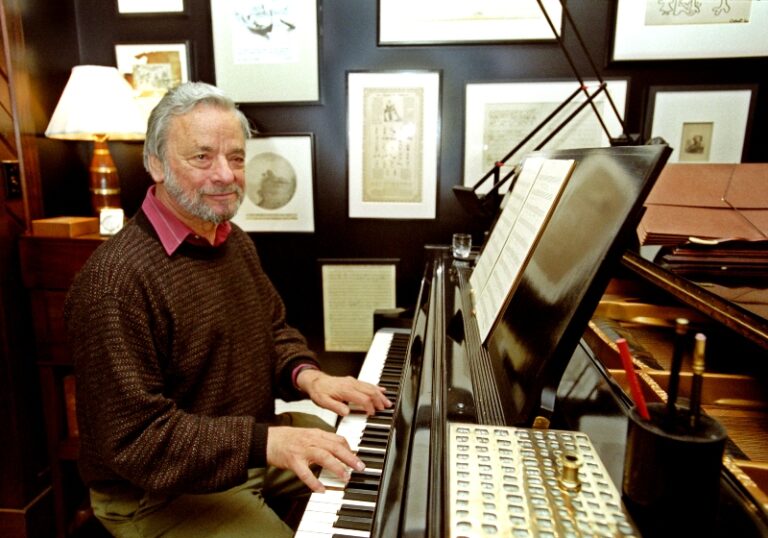
Stephen Sondheim,composer of classic Broadway hits such as Merrily We Roll Along,Follies,Company and Sunday in the Park with George is one of the most original voices in musical theatre. His first big break,as lyricist for West Side Story,meant that for the early part of his career he was better known for his words than his music,but during the 1960s and 1970s it became apparent that he had a unique ability in all areas of the musical. The celebrated revue Side by Side by Sondheim showed that his music could stand alone,whilst the complexities of Into the Woods and the sophistication of Sweeney Todd revealed the great extent of his abilities as a dramatist. His work is always finely poised between high art and popular culture.
Biography
‘There are only two worthwhile things to leave behind when we depart this world of ours: children and art.’ (from Sunday In The Park With George)
Stephen Sondheim can legitimately claim to have raised the artistic standard of American musical theatre to new heights. During his studies with the avant-garde composer Milton Babbitt at Princeton,his ambition to write musicals rather than symphonic music became clear. Babbitt was concerned: ‘I knew something about Broadway and show business,and I don’t care what’s involved,you can have it. Especially in the twenties and thirties,it was a totally unscrupulous world. The best you can say is that they were uneducated vulgarians’. Sondheim’s ambition and determination to succeed in this world began under the influence of Oscar Hammerstein,whose hit show Oklahoma!,written with Richard Rodgers,opened in 1946. It was working as an assistant on a less successful show,Allegro,1947,that gave Sondheim his most important insights into dramatic construction,and the vital relationship between lyrics and music. By the time he came to study with Babbitt,in 1950,Sondheim already knew his medium and was hoping to develop a more sophisticated ‘classical’ technique. Babbitt taught him how to extend a musical structure beyond the length of a song,how to use counterpoint and thematic development,and together they analyzed music by Ravel,Beethoven and Mozart.
Sondheim’s subsequent career has charted the successful development and exploitation of these techniques. The first big break came in 1955,when Sondheim was asked to co-write the lyrics for West Side Story. Leonard Bernstein was quick to hand over sole authorship of the lyrics after the premiere,and shared Sondheim’s frustration with the lack of critical acknowledgement of the younger man’s achievement. Despite this,Sondheim was employed as a lyricist on a couple more shows,before he was able to bring a composition to the stage. Anyone Can Whistle,with its relatively complicated,absurdist drama and typically 1960s emphasis on personal freedom,was not a great success,but it did enable Sondheim to experiment with compositional techniques which represented the limits in experimentation for him at that time. His first really big hit was Company,which opened on Broadway in 1970. This was based on a book by George Furth,and brought together for the first time Sondheim’s regular collaborators,producer Hal Prince and orchestrator Jonathan Tunick. The latter’s Ravel-like approach to the orchestra made clear the interplay of melodic lines and the subtle uses of dissonance that are so much a feature of Sondheim’s music. The lyrics also show a great gift for inner rhyme,subtle shifts in metre,and a matching of words to melody that led to Company being discussed in the heavyweight critical press as well as loved by the general public.
Follies,which opened in 1971,is a reaction against the over-sweetness of many American musicals,and it explores darker themes than Company. The characters are complex and each follows his or her own path to unhappiness. Frank Rich described the show as ‘the death of vaudeville as a metaphor for the death of American innocence’. But it is also apparent that Sondheim approaches the dramatisation as a kind of game. This theme appears again and again,in musicals such as Sunday in the Park with George,1984,and Into the Woods,1987. Characters work through their own personal issues,coming close to or moving away from,self-knowledge and showing evidence of this through their interactions with other characters. In many cases,the struggles undergone by these characters reflect on Sondheim’s own struggles,with his art,with his sexuality,and with his relationships. The musical construction of shows like Merrily We Roll Along,1981) is similar. The score is built from thematic blocks of material juxtaposed and combined in different relationships. Sondheim explained: ‘You take a release from one song and make that a verse for a different song,and then you take a chorus from a song and make that a release for another song,and then you take an accompaniment from yet a different song and make that a verse in another song. So that it’s like modular furniture that you rearrange in a room…’.
Sweeney Todd,1979,is probably the most sophisticated example of all these techniques,conceived with an operatic sense of scale,and flowing seamlessly between song lyrics and dialogue,accompaniment and melody,narrative and raw emotion. Yet it is Sunday in the Park with George which is the most revealing of Sondheim as an artist. He has a tremendous richness of cultural awareness and understanding and a highly developed sense of the artistic worth of his own output. To place that in a commercial context is both difficult and challenging,and Sunday in the Park with George is a meditation on that struggle. The work that Sondheim has left behind carries his personal stamp. In many senses his musicals are his children.
Andrew Hugill
Chronology
-
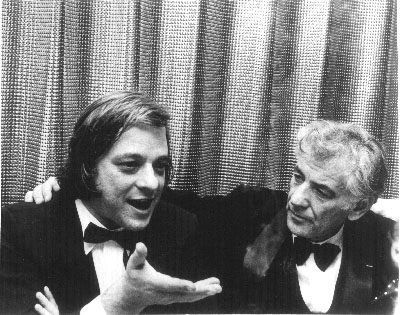
With Leonard Bernstein
-
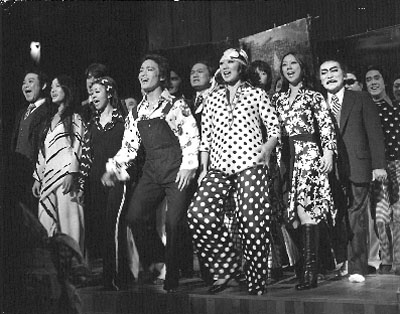
Pacific Overtures, 1976
-
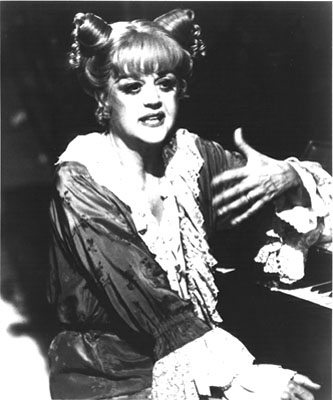
Sweeny Todd, 1979
-
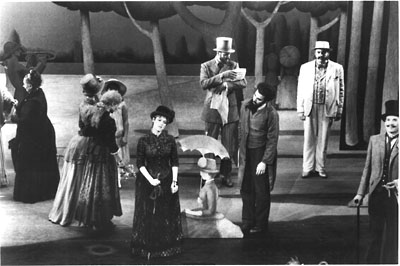
Sunday in the Park with George, 1984
-
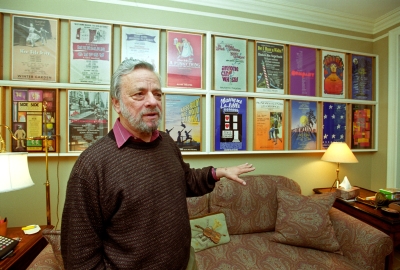
Sondheim in front of posters of his musicals
-
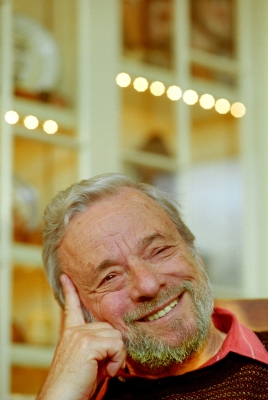
At his New York home

